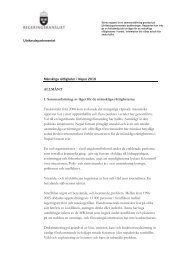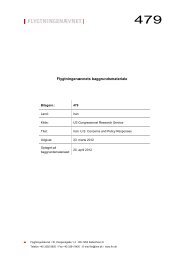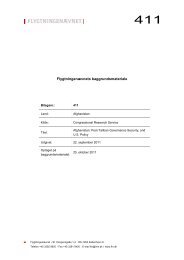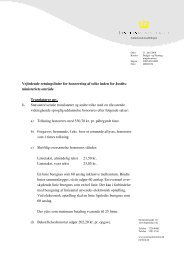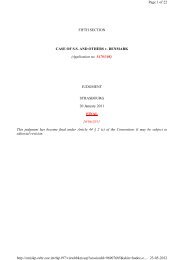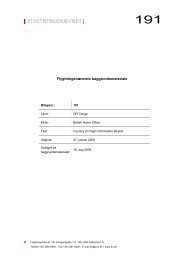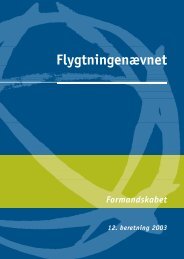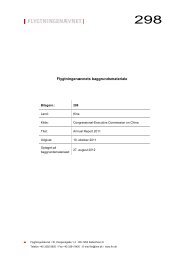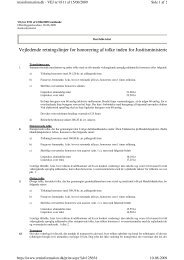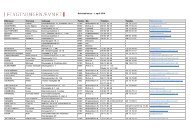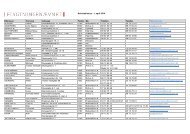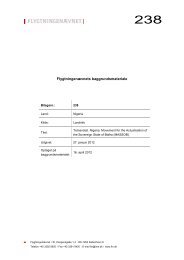Annual Report - National Human Rights Commission
Annual Report - National Human Rights Commission
Annual Report - National Human Rights Commission
You also want an ePaper? Increase the reach of your titles
YUMPU automatically turns print PDFs into web optimized ePapers that Google loves.
Annexure 12<br />
○ ○ ○ ○ ○ ○ ○ ○ ○ ○ ○ ○ ○ ○ ○ ○ ○ ○ ○ ○ ○ ○ ○ ○ ○ ○ ○ ○ ○ ○ ○ ○ ○ ○ ○ ○ ○ ○ ○ ○ ○ ○ ○ ○ ○ ○ ○ ○ ○ ○ ○ ○ ○ ○ ○ ○ ○ ○ ○ ○ ○<br />
○<br />
Section 19<br />
It relates to the application by a person seeking permission for being kept in a protective home.<br />
This section may be amended to authorise NGOs, or an advocate or any person working for the<br />
cause of victims of exploitation, to file such an application.<br />
Section 21<br />
The state governments are authorized under this section to set up protective homes. The mandate<br />
for setting up such homes may also be extended to “the appropriate authority” constituted under<br />
the JJ Act, 2000.<br />
Moreover in this section, after the word “establish”, the following words may also be added: “or<br />
recognize”. Wherever the government is unable to accomplish the task, recognition could be<br />
granted to appropriate agencies to do the needful.<br />
Section 22 (A), Section 22 (AA) and Section 22 (B)<br />
These may be amended to raise the level of the courts dealing with ITPA to the court of additional<br />
sessions judge. The schedules attached to ITPA should also be changed accordingly. Appointment<br />
of special judicial officers could be considered. These could be exclusive courts dealing with<br />
ITPA and all related offences.<br />
Developing a Code<br />
The Act authorizes the central and state governments to set up special courts under Section<br />
22AA. However, it does not speak about procedures. Victim-friendly procedures have to be<br />
made part of the law, by developing it into a code, as stated earlier. It would be advisable that the<br />
code takes into account all the relevant points discussed in this chapter.<br />
Extraterritorial Legislation<br />
Trafficking in women and children is a crime which often transcends international boundaries<br />
calling for universal jurisdiction and, therefore, it cannot be inconsistent with the condition of<br />
jurisdictional limitations arising out of the nationality of the offender. In accordance with the<br />
provisions of the UN Trafficking Protocol as well as the optional protocol to the CRC, there is a<br />
need for extraterritorial legislation. An offence under this Act should have a universal jurisdiction.<br />
A crime by anybody in India should be made triable in the country he/she belongs to, subject to<br />
the doctrine of dual criminality. Similarly, any crime under this law, if committed by an Indian<br />
national anywhere in the world, will be deemed to be an offence under this law and should be<br />
tried by any court in India (which is otherwise authorised to try an offence under this Act).<br />
Victim Assistance Programmes<br />
The law should have specific Victim Assistance Programmes. The principles of criminal justice<br />
begin with the victims and survivors. In the present system, the emphasis and orientation is only<br />
on the prosecution of the accused and not on justice delivery to the victims or her family members.<br />
<strong>National</strong> <strong>Human</strong> <strong>Rights</strong> <strong>Commission</strong> <strong>Annual</strong> <strong>Report</strong> - 2004-2005<br />
299<br />
AR-Chapter-1-19-10-6-06.p65<br />
319<br />
7/17/06, 6:31 PM



